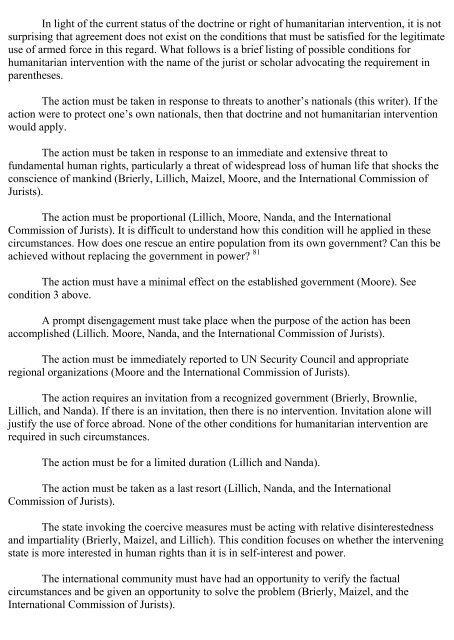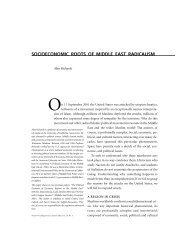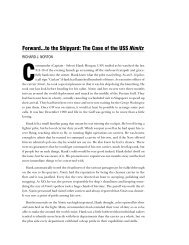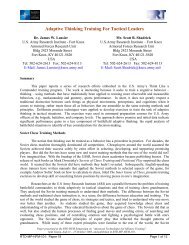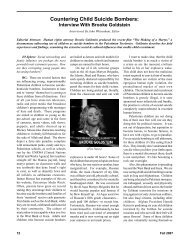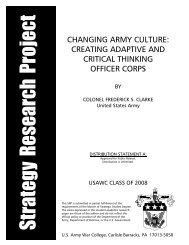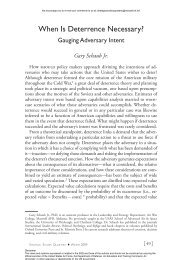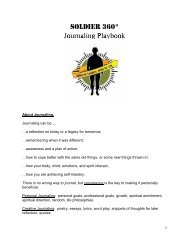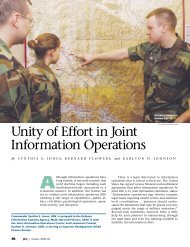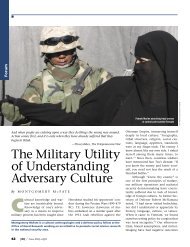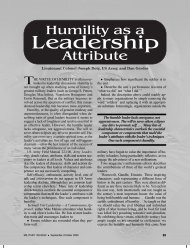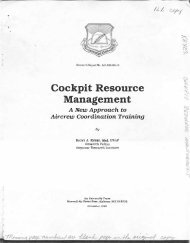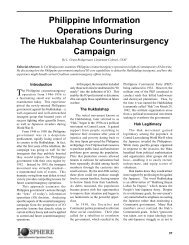Legitimate use of military force against state-sponsored - Air University
Legitimate use of military force against state-sponsored - Air University
Legitimate use of military force against state-sponsored - Air University
You also want an ePaper? Increase the reach of your titles
YUMPU automatically turns print PDFs into web optimized ePapers that Google loves.
In light <strong>of</strong> the current status <strong>of</strong> the doctrine or right <strong>of</strong> humanitarian intervention, it is not<br />
surprising that agreement does not exist on the conditions that must be satisfied for the legitimate<br />
<strong>use</strong> <strong>of</strong> armed <strong>force</strong> in this regard. What follows is a brief listing <strong>of</strong> possible conditions for<br />
humanitarian intervention with the name <strong>of</strong> the jurist or scholar advocating the requirement in<br />
parentheses.<br />
The action must be taken in response to threats to another’s nationals (this writer). If the<br />
action were to protect one’s own nationals, then that doctrine and not humanitarian intervention<br />
would apply.<br />
The action must be taken in response to an immediate and extensive threat to<br />
fundamental human rights, particularly a threat <strong>of</strong> widespread loss <strong>of</strong> human life that shocks the<br />
conscience <strong>of</strong> mankind (Brierly, Lillich, Maizel, Moore, and the International Commission <strong>of</strong><br />
Jurists).<br />
The action must be proportional (Lillich, Moore, Nanda, and the International<br />
Commission <strong>of</strong> Jurists). It is difficult to understand how this condition will he applied in these<br />
circumstances. How does one rescue an entire population from its own government? Can this be<br />
achieved without replacing the government in power? 81<br />
The action must have a minimal effect on the established government (Moore). See<br />
condition 3 above.<br />
A prompt disengagement must take place when the purpose <strong>of</strong> the action has been<br />
accomplished (Lillich. Moore, Nanda, and the International Commission <strong>of</strong> Jurists).<br />
The action must be immediately reported to UN Security Council and appropriate<br />
regional organizations (Moore and the International Commission <strong>of</strong> Jurists).<br />
The action requires an invitation from a recognized government (Brierly, Brownlie,<br />
Lillich, and Nanda). If there is an invitation, then there is no intervention. Invitation alone will<br />
justify the <strong>use</strong> <strong>of</strong> <strong>force</strong> abroad. None <strong>of</strong> the other conditions for humanitarian intervention are<br />
required in such circumstances.<br />
The action must be for a limited duration (Lillich and Nanda).<br />
The action must be taken as a last resort (Lillich, Nanda, and the International<br />
Commission <strong>of</strong> Jurists).<br />
The <strong>state</strong> invoking the coercive measures must be acting with relative disinterestedness<br />
and impartiality (Brierly, Maizel, and Lillich). This condition foc<strong>use</strong>s on whether the intervening<br />
<strong>state</strong> is more interested in human rights than it is in self-interest and power.<br />
The international community must have had an opportunity to verify the factual<br />
circumstances and be given an opportunity to solve the problem (Brierly, Maizel, and the<br />
International Commission <strong>of</strong> Jurists).


